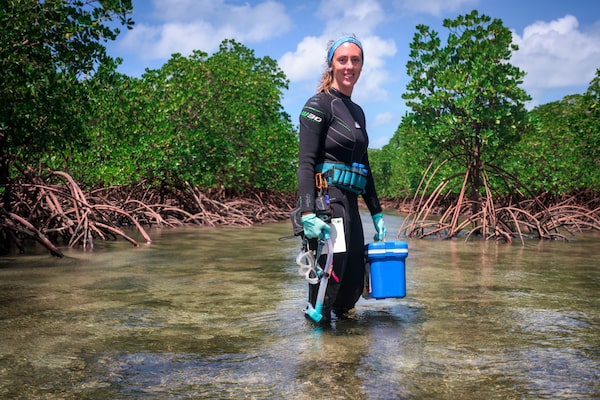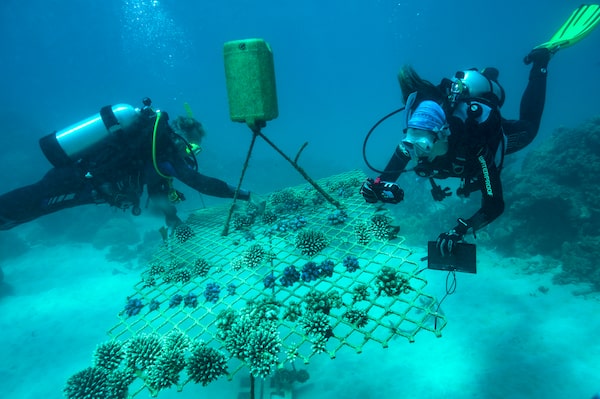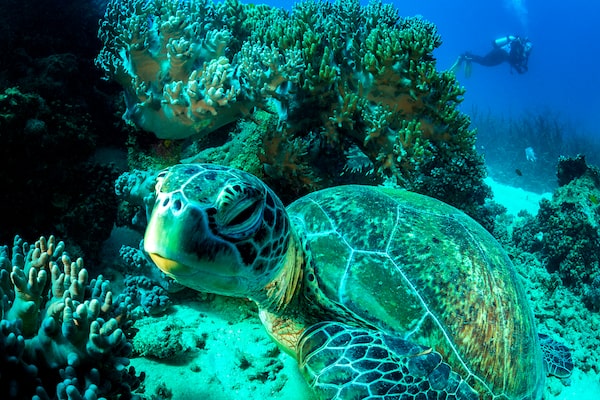The ocean’s reefs are in hot water. And this marine biologist is taking action.
Ocean explorer Emma Camp studies corals that survive in hostile conditions and hopes to bring their survival skills to the Great Barrier Reef.
©Rolex/Franck Gazzola
Stretching for more than 2,300 kilometres along the coast of Australia, the Great Barrier Reef is home to over 9,000 species ranging from sharks to sea worms, all of whom depend on coral for their survival. The Great Barrier reef, however, is threatened by climate change, and large portions of it are dead or dying.
British-born marine biologist and explorer Emma Camp’s mission is to save as much of the surviving reef as possible while finding new ways to regrow the corals that have been lost. This ambitious and important work brought Camp to the attention of the Rolex Awards for Enterprise, which honoured her as a laureate in 2019. Launched in 1976 to celebrate the 50th anniversary of Rolex’s Oyster – the world’s first waterproof wristwatch – these awards applaud innovative spirits who are finding new ways to protect the planet’s ecosystems.
The Rolex Awards for Enterprise were envisioned to lend much-needed support to exceptional individuals who are working to advance human knowledge and protect the planet’s most vulnerable species and ecosystems. As one of 155 individuals from 190 countries to be honoured as a Rolex Awards Laureate to date, we spoke to Camp about her work, her love of the oceans and what gives her hope for the future.

Camp is battling ecological grief with hope. “Millions of people rely on the reef for future survival …I’m just really motivated to try and ensure they persist into the future”©Rolex/Franck Gazzola
How did you first become interested in coral reefs?
I always had an innate love for the ocean. When I was about eight or nine I was able to go to the Caribbean and snorkel for the first time, and that’s when I first saw a coral reef. I just remember being amazed that there’s life under the water that you can’t see you the surface – all these colourful fish and all this coral. That kind of hooked me on coral reefs, but it wasn’t until I was in college that I got a chance to see scientists working and studying the reef. That’s when I learned that they’re so important, but they’re being impacted by human activity and that there’s a real risk they could be lost. That was when I decided to get involved to prevent that from happening.

Camp’s underwater nurseries is where she and her team assist in propagating the Great Barrier Reef’s coral population.©Rolex/Franck Gazzola
What are you hoping to accomplish through your work on the Great Barrier Reef in Australia?
We think about 50 per cent of the Great Barrier Reef is lost, and 30 per cent of that has been lost in the last five years. I and other scientists are trying to think about what human intervention can be utilized to boost the resilience of the reef to give it the best chance to recover. My approach is to find nature’s naturally tolerant corals in places like mangrove lagoons, where the waters are naturally warm, acidic and have low oxygen – which is what’s happening under climate change for the oceans. It’s like a natural laboratory, and we can see which corals have survived, and with that information we can then use those corals to manage the reef, growing them in nurseries and planting them.
Why is now such an important time to be studying coral?
Many of our ecosystems are really at this crucial point, and what we do over the next five years is going to be so pivotal in terms of ensuring their long-term survival; not just what happens within the scientific community, but also in terms of climate action and meeting the targets of the Paris Agreement. How much reef are we going to lose? How much are we going to be able to protect? And for those that we need to protect, how will we ensure there’s a reservoir of corals to re-seed areas that are going to are going to be lost?
Marine biologist Emma Camp talks about the changes needed to protect our oceans’ reefs. The award-winning scientist warns Australia’s Great Barrier Reef faces a dire future.
How did being named a Rolex Awards for Enterprise Laureate help you with your work?
It provided financial support that has helped with some of the ongoing research costs, and that’s a big, big benefit for what I’m trying to do. Beyond that, the opportunity to communicate the research that I’m doing to a broader audience has been great. I’ve had other collaborators reach out to me, other opportunities presented through that visibility, and I hope that through that communication more people have become aware of the reef and the problems that it’s facing.

The world’s coral reefs could disappear in less than 10 years but Camp says all is not lost yet: “Every action that we take can make a difference.”©Rolex/Franck Gazzola
If you had one message to share with the world about reefs and climate change, what would it be?
If we do not address climate change there is a real risk that we could lose coral reefs, at least as we know them, in our lifetime. Every action that we take from the moment that we wake up to the moment we go to bed is connected to nature, so nobody should feel that they can’t make a difference. If, as a collective, we all reflected on our everyday activities and made even small adjustments, that could be really powerful. This can include turning lights off, recycling, upcycling, and driving your car less. For those of us who can vote, ensuring we use that to support candidates committed to environmental protection and climate action is crucial. We’re in a dire situation and time is critical, but it’s not all lost yet, which is why we should be hopeful and why we should be working so hard now to conserve it.
Advertising feature produced by Globe Content Studio with Rolex. The Globe’s editorial department was not involved.